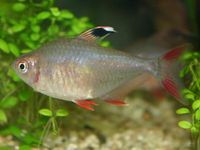Difference between revisions of "Hyphessobrycon rosaceus"
From The Aquarium Wiki
m |
|||
| Line 36: | Line 36: | ||
|max_water_hardness=20 | |max_water_hardness=20 | ||
}} | }} | ||
| − | + | ||
| − | + | == Origin == | |
| − | + | :South America: Essequibo, Corantijn and Suriname River basins. | |
| − | + | ||
| − | + | ||
| − | + | == Sexing == | |
| − | + | :Females are fuller in the belly than males. | |
| − | + | ||
| − | + | ||
| − | + | == Tank compatibility == | |
| + | :A peaceful community fish best kept in groups of 6 or more. Keep with other peaceful community fish but avoid slow-moving long-finned tank mates in case of fin nipping. | ||
| + | |||
| + | |||
| + | == Diet == | ||
| + | :Will accept most foods including pellet and flake as well as live/frozen food such as [[brine shrimp]] and [[daphnia]]. | ||
| + | |||
| + | |||
| + | == Feeding regime == | ||
| + | :Feed once or twice a day. | ||
| + | |||
| + | |||
| + | == Environment specifics == | ||
| + | :Prefers a spacious tank with some dense planting and hiding places as well as open swimming space. | ||
| + | |||
| + | |||
| + | == Behaviour == | ||
| + | :An active peaceful shoaling fish. | ||
| + | |||
| + | |||
| + | == Identification == | ||
| + | :Similar in body shape to the [[Black Widow Tetra]], but with different colouring. The body is a red-orange colour, the dorsal is black, the anal fin is mostly clear but edged in black with the tip in red and white. The two pelvic fins are also edged with red and tipped with white. The caudal fin is mostly clear, but edged with black and has a red band on either lobe. | ||
| + | |||
| + | |||
{{Categories | {{Categories | ||
|Category=Fish, Fish (Freshwater), Characins, Tetras, Tetras, Shoaling Community Fish | |Category=Fish, Fish (Freshwater), Characins, Tetras, Tetras, Shoaling Community Fish | ||
Revision as of 03:02, 13 December 2017
Hyphessobrycon rosaceus
57 Litres (15 US G.)
3-4.1cm (1.2-1.6 ")
Freshwater
5.8 - 7.5
24 -28 °C (75.2-82.4°F)
10-20 °d
1:2 M:F
3-5 years
Family
Characidae
Contents
Additional names
- Rosy Tetra, Bentosi Tetra, White-Tip Tetra, Ornate Tetra
Additional scientific names
- Hyphessobrycon bentosi rosaceus, Cheirodon troemneri, Hyphessobrycon ornatus
Origin
- South America: Essequibo, Corantijn and Suriname River basins.
Sexing
- Females are fuller in the belly than males.
Tank compatibility
- A peaceful community fish best kept in groups of 6 or more. Keep with other peaceful community fish but avoid slow-moving long-finned tank mates in case of fin nipping.
Diet
- Will accept most foods including pellet and flake as well as live/frozen food such as brine shrimp and daphnia.
Feeding regime
- Feed once or twice a day.
Environment specifics
- Prefers a spacious tank with some dense planting and hiding places as well as open swimming space.
Behaviour
- An active peaceful shoaling fish.
Identification
- Similar in body shape to the Black Widow Tetra, but with different colouring. The body is a red-orange colour, the dorsal is black, the anal fin is mostly clear but edged in black with the tip in red and white. The two pelvic fins are also edged with red and tipped with white. The caudal fin is mostly clear, but edged with black and has a red band on either lobe.
Pictures
External links
- Fishbase (Mirrors:
 )
)
